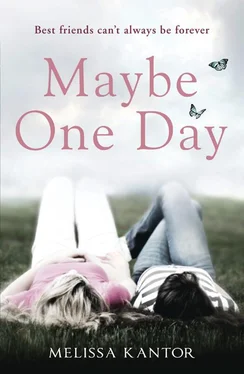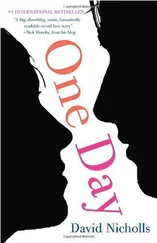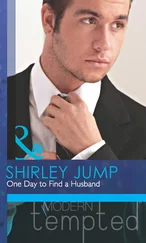Olivia shook her head. “Not yet. I have a funny taste in my mouth.” Livvie ran her tongue along her teeth and made a face. “It’s weird.”
“Unfortunately, I can’t help you with that, but if it’s making you nauseous, let me know. Like I said before, it’s hard to get the horse back in the barn once he’s out.”
I had no idea what she was talking about, but Olivia must have because she nodded. Dr. Maxwell looked around the room. “Everything seems okay for now,” she said. “Olivia’s off to a good start.”
I hadn’t noticed how quiet the room had gotten while Dr. Maxwell was examining Olivia, but as soon as she gave her assessment, the buzz of conversation that started up again made me feel the silence her presence had generated. It reminded me of how it had been in a dance class when Martin Hicks, the NYBC director, would pay one of his occasional visits. You didn’t realize how tightly you’d been holding everything in—how high you’d been lifting your leg, how far you’d extended your arms—until he left and you felt the collective tension seep out of the room as everyone literally gave a sigh of relief.
Now people went back to their conversations. Dr. Maxwell stood next to the bed. “So,” she said, “Olivia and her family and I had a long talk earlier, but she asked me to come back and explain some things about her illness to you.”
I looked at Olivia. “Really? You wanted her to explain everything to me, too?”
Livvie nodded. I loved her so much right at that instant I almost cried.
“Now, what do you know about leukemia?” asked Dr. Maxwell.
“It’s got something to do with Olivia’s blood,” I answered, purposely not using the word cancer .
“Good,” said Dr. Maxwell, and even though we were talking about a deadly disease that my best friend had, I felt glad to have gotten the answer right. “It does have to do with blood. Specifically, it’s a cancer of the blood.”
“Actually, I was trying to avoid the c word,” I explained.
Olivia laughed, and even Dr. Maxwell cracked a smile. “We use the c word a lot around here,” Dr. Maxwell assured me. “Now, there are different types of leukemia. Most children and teens get something called acute lymphoblastic leukemia, or ALL. Olivia has acute myeloid leukemia, or AML. It’s a cancer more commonly associated with males in their sixties.”
Livvie turned to me. “I have old-man cancer. Isn’t that so humiliating?”
“It is , actually. But I won’t tell anyone,” I promised.
Dr. Maxwell was shaking her head. I couldn’t tell if she was amused or irritated by the way we were talking. “In a healthy person,” she went on, “blood is formed inside the soft, spongy part of the big bones in your body, such as your femur. You know what your femur is?” I nodded. Our first year at NYBC, a girl in our class had had a skiing accident and broken her femur. I still remembered when one of the worst dancers in our class had pulled us aside to tell us about the accident. She may never dance again. Her face had been bright pink with the drama of the moment.
“Your femur’s here.” I hit my thigh as I said it.
“Correct,” Dr. Maxwell said. “So blood is born—formed—in the bone marrow. There, immature cells called blasts grow into mature blood cells: white blood cells, red blood cells, or platelets. Think of bone marrow as a school. Or a house. The kids grow up, learn a trade, then leave home and go to work at a job.
“But leukemia stops blood cells from doing that. In a person with AML, instead of making normal blasts, which grow into normal blood cells, the bone marrow starts making cancerous cells. They divide quickly and uncontrollably. They don’t do their jobs. And they fill up the bone marrow so that there’s no room for normal, healthy cells to be made or to grow. The immature cells are strong and hard to kill. They’re like child soldiers.”
Dr. Maxwell pointed behind her at the IV bag hanging on the pole beside Olivia’s bed. “The drugs we’re giving Olivia right now are drugs that target rapidly dividing cells, such as myeloblasts.”
“And hair,” Olivia said. Her voice was quieter than it had been. I patted her arm, not sure what else to do.
“And hair,” Dr. Maxwell said, and now I was grateful for how matter-of-fact she was about everything. “Because chemotherapy targets all rapidly dividing cells, it unfortunately doesn’t only get cancer cells.”
I’d always wondered why people with cancer lost their hair. “Why can’t they invent drugs that target rapidly dividing sick cells only?” I asked.
“Well, we’re working on it,” Dr. Maxwell said. She pushed her glasses up on the bridge of her nose. “I promise you. We’re all working on it.”
I couldn’t take Dr. Maxwell’s being so nice. It made me want to cry. Instead I asked, “Will she get sick? I mean, will she throw up?” Livvie made a face. She hated throwing up. Not that anyone likes it, but Livvie really really hated it.
“She may experience nausea and vomiting,” Dr. Maxwell said. “Chemotherapy triggers a chemical response in the brain that makes some people sick to their stomach. But the good news is we have a lot of drugs to make Olivia comfortable. Hopefully she’ll only have very mild side effects.”
“That’s kind of lame good news, Dr. Maxwell,” said Olivia.
“It is,” Dr. Maxwell agreed, and she stroked Olivia’s forehead gently. I’d never seen a doctor do something like that.
“When can she come home?” I asked. If she was home by Friday, I could spend the weekend at her house with her. We could watch distracting movies all day.
Dr. Maxwell’s voice was businesslike. “Three to four weeks.”
Three to four weeks? I tried to keep my voice neutral. “I thought … I thought maybe she’d be home this weekend.”
Dr. Maxwell shook her head. “The chemotherapy itself only lasts for about a week, but it destroys so many blood cells that a person is very vulnerable to infection. We keep her here until her blood counts go up.”
My head spun. How could Livvie be in the hospital for an entire month ?
They were both staring at me. I had to say something, but my panic had parched my lips and my tongue felt glued to the roof of my mouth. “Well …” I cleared my throat, hoping to make my voice more normal. “And then … that’s it, right? She’s done?”
Livvie shook her head. “That’s just the first round. Then I have to do it three more times.”
“Three more times?” It came out like a wail, which I immediately regretted.
My response triggered something in Livvie, who suddenly looked distraught. “And I might not be able to go to school between treatments at all .”
“Wait, you’re going to miss months of school? I—” I bit my tongue. Literally. Because here’s what your best friend doesn’t need to hear you say when she’s just found out she has cancer: I can’t deal with that.
“This is a lot to take all at once, I know,” said Dr. Maxwell. She furrowed her forehead in a way that somehow managed to be concerned and not pitying. “And it’s not the last time you’ll be able to ask me questions.” Dr. Maxwell put her hand on Olivia’s shoulder. “I’ll see you tomorrow, but if something comes up during the night, they’ll page me.”
“Okay,” said Olivia. “Thanks, Dr. Maxwell.”
“Yes,” I said, trying to capture an optimistic tone. “Thanks for explaining all of this to me.”
She smiled at me. “Olivia is very lucky to have a friend like you.”
Dr. Maxwell said good-bye to everyone, and when the door had closed behind her, Mrs. Greco clapped her hands together once. “Now I’m sending everyone home. Our girl needs to get her rest.”
Читать дальше












